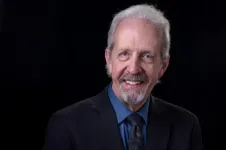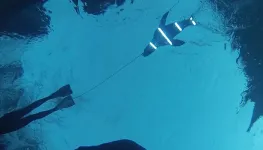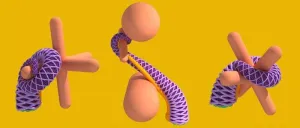(Press-News.org) NEW YORK – November 11, 2024 – The Cardiovascular Research Foundation® (CRF®) proudly announces the appointment of Dr. Jeffrey Popma as Chief Scientific and Strategic Officer. A world-renowned leader in cardiovascular research, Dr. Popma will drive forward pivotal programs and initiatives that will shape CRF’s future and fuel innovation at the CRF® Clinical Trials Center (CTC). His leadership will be instrumental in the development of the recently launched Real-World Data and Outcomes Center, advancing CRF’s commitment to impactful research. Additionally, as Program Director for New York Valves and TCT® (Transcatheter Cardiovascular Therapeutics®), CRF’s flagship scientific meeting, Dr. Popma will play a key role in guiding the organization’s transformative contributions to the field of cardiovascular medicine.
“Jeff was an early leader at CRF® and TCT® and has had an illustrious career as a practicing interventionalist, academician, and thought leader, “said Martin B. Leon, MD, Founder and Chairman Emeritus of CRF®. “I am thrilled that Jeff is returning to CRF® as the Chief Scientific and Strategic Officer, a leadership role that will strengthen our depth and focus in achieving future creative goals in academic achievement, advanced data science, and medical education.“
“Jeff’s extensive expertise and visionary leadership will be invaluable as we continue to drive innovation and excellence in cardiovascular research and education,” said Juan F. Granada, MD, President and Chief Executive Officer of CRF®. “We are excited about the contributions he will make in furthering our mission, advancing the understanding of cardiovascular disease, and improving patient outcomes.”
With decades of clinical and research experience, Dr. Popma has made significant contributions to cardiovascular therapies and minimally invasive cardiac interventions. Over the course of his career, he has authored more than 500 peer-reviewed manuscripts, further advancing the field. He played a pivotal role as a course director during TCT's formative years and served as Director of CRF’s Angiographic Core Laboratory. He returns to CRF® after positions as Director, Interventional Cardiology at the Brigham and Women’s Hospital and Beth Israel Deaconess Medical Center in Boston. Most recently, Dr. Popma was the Chief Medical Officer for Coronary, Renal Denervation, and Structural Heart at Medtronic.
“I am thrilled to return to the esteemed faculty of the Cardiovascular Research Foundation®, an organization that is dedicated to academic excellence and committed to advancing cardiovascular research and innovation,” said Dr. Popma. “I look forward to collaborating with the world-renowend physician leadership at CRF® and am eager to contribute to its high-quality educational and research initiatives, focusing on publications, “real world” data analytics, clinical trial metrics, and Core Lab activities.”
Dr. Popma is a Professor of Medicine, Emeritus, Harvard Medical School in Boston. He is a former Past President of the Society for Cardiovascular Angiography and Intervention (SCAI) and former Co-Chairman of the Interventional Council at the American College of Cardiology (ACC). Dr. Popma received his bachelor’s in economics from Stanford University, and his medical degree summa cum laude from the Indiana University School of Medicine.
About CRF® and TCT®
The Cardiovascular Research Foundation® (CRF®) is a global leader in interventional cardiovascular medicine, driving innovation, spearheading groundbreaking research, and transforming education in the field. Through its relentless pursuit of excellence, CRF® not only accelerates medical breakthroughs but also equips healthcare professionals with the tools and knowledge necessary to enhance survival rates and elevate the quality of life for millions worldwide. CRF’s centers of excellence include the CRF Skirball Center for Innovation, CRF Clinical Trials Center, CRF Center for Education, CRF Digital, TCTMD, and Structural Heart: The Journal of the Heart Team.
For more information, visit www.crf.org.
###
END
Larry Seiber, an R&D staff member in the Vehicle Power Electronics group at the Department of Energy’s Oak Ridge National Laboratory, has been elevated to senior member of the Institute of Electrical and Electronics Engineers, or IEEE.
Senior member status requires extensive experience that reflects professional accomplishments. Only 10% of IEEE’s more than 450,000 members achieve this level.
Seiber has conducted decades of cutting-edge research in power electronics and electric machinery. He developed the hardware ...
People inherit two copies of each gene — one from each parent — an evolutionary fail-safe to ensure survival even when one of them doesn’t function.
For cancer-suppressor genes like BRCA1, researchers have long hypothesized that a single healthy copy could still guard against tumor development. Yet women with one harmful BRCA1 mutation are far more likely to develop breast cancer — a risk traditionally explained by a second mutation that arises later in life, damages the healthy copy of the gene, ...
AMES, Iowa – In their long strings of nucleotides, DNA molecules hold massive troves of genetic data providing instructions for how living organisms should function – the blueprint of life. How the blueprint is stored, however, impacts how it is read and used.
As cells divide and replicate, DNA strands coiled around proteins – chromatin – are in tightly bundled chromosomes. After division, the chromosomes loosen and chromatin is less compact. How and where the chromatin fiber folds and ...
Adolescents who meet the recommended guidelines of nine to 11 hours of sleep per day were shown to have a significantly lower risk of hypertension, according to a new study from UTHealth Houston.
Recently published in the Journal of the American Heart Association, the research revealed that adolescents had a 37% lower risk of developing incidents of high blood pressure by meeting healthy sleep patterns, and underscoring the importance of adequate sleep behavior. The research further explored the ...
How would you summarize your study for a lay audience?
T helper (TH) cells are essential immune cells that help other immune cells function effectively. When activated in response to environmental stimuli, these cells can differentiate into either TH1 cells, which fight against viruses and intracellular pathogens, or TH2 cells, which fight against extracellular pathogens like bacteria and parasites. However, scientists haven’t fully understood whether infected tissue itself has any role in directing the optimal T cell differentiation in response ...
Current guidelines recommend that pregnant people receive a vaccine against respiratory syncytial virus (RSV)—which typically causes mild, cold-like symptoms in most adults but can be deadly for infants—during weeks 32–36 of pregnancy. New research led by investigators at Mass General Brigham suggests that vaccination earlier in that timeframe, closer to 32 weeks, could provide the best protection for newborns against RSV. The findings are published in the American Journal of Obstetrics & Gynecology.
“Receiving ...
Surfers could be protected from future shark attacks following new discoveries about how to trick sharks’ visual systems made by Professor Nathan Hart, head of Macquarie University’s Neurobiology Lab, Dr Laura Ryan and colleagues.
Hart, Ryan and their co-authors of a new paper in Current Biology titled Counterillumination reduces bites by Great White Sharks say their work “may form the basis of new non-invasive shark deterrent technology to protect human life”.
These researchers previously discovered that great whites place a high reliance ...
Embargoed for release until 5:00 p.m. ET on Monday 11 November 2024
@Annalsofim
Below please find summaries of new articles that will be published in the next issue of Annals of Internal Medicine. The summaries are not intended to substitute for the full articles as a source of information. This information is under strict embargo and by taking it into possession, media representatives are committing to the terms of the embargo not only on ...
LOS ANGELES — Alcohol use increased during the COVID-19 pandemic and remained elevated even after the pandemic ended, according to a large nationally representative Keck Medicine of USC study published today in the Annals of Internal Medicine.
From pre-pandemic (2018) to the height of the pandemic (2020), heavy alcohol use among Americans rose by 20%, and any alcohol use rose by 4%. In 2022, the increases were sustained.
The rise in drinking was seen across all age groups, genders, race, ethnicities and regions of the country, except for Native Americans and Asian Americans. Adults ...
Mechanical engineering PhD candidate Arman Tekinalp, fellow graduate student Seung Hyun Kim, Professor Prashant Mehta, and Associate Professor Mattia Gazzola, all from the Department of Mechanical Science and Engineering at the University of Illinois Urbana-Champaign, recently published in the Proceedings of the National Academy of Science (PNAS). Their interdisciplinary collaboration also included Assistant Professor Noel Naughton (formerly a Beckman fellow) from the Department of Mechanical Engineering at Virginia Tech alongside researchers from the Department of Molecular and Integrative Physiology at Illinois ...



